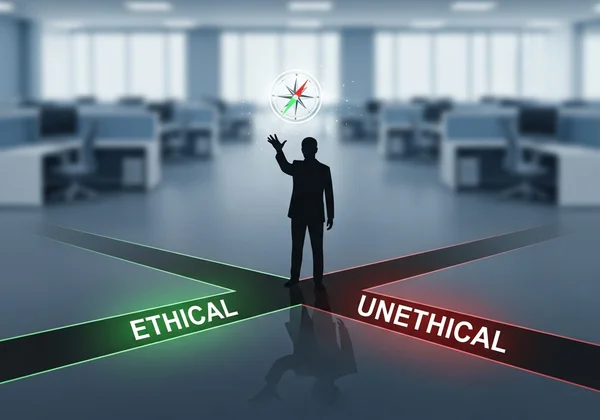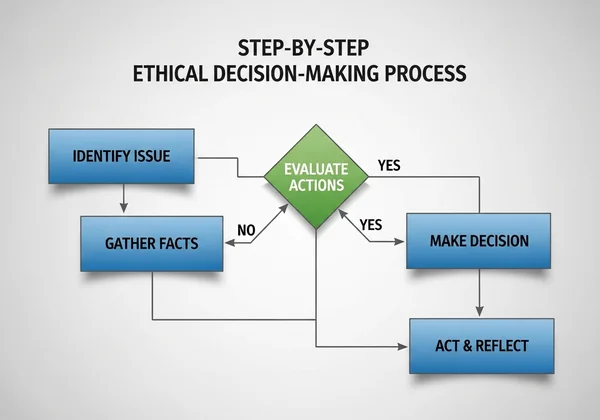職場道德困境:健全決策的 道德試煉
September 2, 2025 | By Julian Croft
在現代職場中,經常會面臨複雜的道德挑戰。從微妙的利益衝突到資料隱私的重大決策,您做出正確道德判斷的能力對於專業誠信和職涯發展至關重要。績效壓力有時會模糊對錯的界線,從而產生重大的 職場道德困境。但是,在專業環境中,我該如何釐清我的道德和價值觀,才能始終做出正確的選擇?本指南將探討常見的道德困境,並提供 實用的框架,幫助您建立並信任您的道德指南針。
了解您的基本價值觀是 釐清道德觀 的第一步。更深入的自我意識能讓您自信且堅定地行動。要開始這趟自我發現之旅,您可以透過由心理學和倫理學專家設計的工具,探索您的道德核心。

您可能會遇到的常見商業倫理範例
道德挑戰不總是戲劇性的頭條醜聞。更多時候,它們是微妙的日常情境,考驗著我們的價值觀。識別這些情境是有效處理它們的第一步。以下是 專業人士與主管 面臨的一些最常見的商業倫理範例。
利益衝突的挑戰
當您的個人利益——或與您有密切關係者的利益——可能干擾您的專業職責或判斷時,就會產生利益衝突。這可能涉及聘用能力較差的家庭成員、接受供應商的貴重禮物,或利用公司資源經營個人副業。例如,想像一位經理在未披露供應商公司由其配偶所有的情况下,批准了該供應商的發票。即使價格合理,缺乏透明度也會造成嚴重的 道德違規。這些情況會損害客觀性,並可能侵蝕團隊內部和客戶之間的信任。管理這些問題的關鍵是充分披露、透明化,並在必要時迴避。
維護資料隱私和機密性
在我們的數位時代,公司處理著大量的敏感資料,從客戶資訊到員工記錄和專有商業機密。當您被誘惑濫用這些資訊時,就會出現道德困境,例如與新雇主分享機密的客戶詳細資料,或將客戶資料用於未經批准的行銷。維護資料隱私不僅是法律要求,更是一項基本的道德義務,它能建立信任並保護 權益關係人 免受損害。這包括向客戶透明地說明其資料的使用方式,即使您的方法符合法律規定,因為這尊重了他們的自主權並建立了長期的忠誠度。

報告誠實的重要性
無論是報告財務結果、專案進度還是職場事件,誠實都是最重要的。專業人士常常面臨壓力,為了取悅上司而美化結果,為了避免責備而隱藏錯誤,或者為了獲得合約而淡化風險。雖然短期收益可能看似誘人,但不誠實的報告會損害 公信力,可能導致災難性的長期後果,並滋生一種有毒的欺騙文化。即使困難重重,對真相的承諾也是道德領導力的基石。
處理職場歧視和騷擾
創造一個公平和相互尊重的職場環境是 道德上的必要條件。當您目睹微妙的歧視、聽到不恰當的笑話,或注意到招聘做法似乎存在偏見時,這方面的困境就會出現。道德的選擇是發聲並採取行動,但害怕報復或希望避免衝突可能會使這變得困難。「發聲」可以採取多種形式:如果您感到安全,可以直接解決該行為;向人資部門或信任的經理報告事件;或仔細記錄您所目睹的一切。然而,忽視此類行為會助長有害的環境,並違反尊嚴和平等的基本原則。
應對送禮、賄賂和腐敗
友善的姿態和賄賂之間的界線有時可能模糊不清。客戶贈送的小禮物可能可以接受,但旨在影響重大商業決策的昂貴禮物則不然。涉及賄賂和腐敗的道德困境考驗著您的正直和對組織的忠誠。熟悉公司的政策並 以全然透明的方式行事 至關重要,以避免任何不當行為的觀感。一個強大的 道德指南針測試 可以幫助您澄清在這些重要問題上的立場。
職場道德決策框架
當面臨困難的選擇時,採用結構化的方法可以幫助您超越直覺,做出更理性、更 有說服力 的決策。這些框架為您的道德推理提供了清晰度和一致性。
循序漸進的道德決策過程
當您遇到道德困境時,不要急於下結論。相反,請遵循結構化的流程,以確保您考慮到所有角度。
-
識別道德問題:清晰地定義問題。哪些價值觀存在衝突?(例如,誠實與忠誠)。
-
收集事實:收集所有相關資訊。利害關係人是誰,他們的觀點是什麼?審查任何適用的公司政策或法律義務。
-
評估替代行動:集思廣益,提出多種選擇。使用不同的道德視角考慮每個選擇的潛在後果。例如,哪個選項能為最多數人帶來最大利益(功利主義)?哪個選項符合普遍規則和職責(義務論)?
-
做出決定並測試:選擇最佳選項。問自己:「如果這個決定被新聞公開,我會作何感受?」或者「我會希望別人在類似情況下做出這個選擇嗎?」
-
行動與反思:實施您的決定。之後,反思結果。您從這次經歷中學到了什麼?您或組織下次如何能處理得更好?

運用您的個人道德指南針
您的內在價值觀和原則構成了您的個人道德指南針。即使無人看管,這個指南針也會引導您的行動。然而,如果沒有自我反思,您可能無法完全意識到是什麼驅動著您的決策。您是否優先考慮同情心、公平、忠誠還是權威?了解您的核心道德基礎對於自信地應對灰色地帶至關重要。
線上道德測試 可以為您獨特的 道德特質 提供寶貴的、由人工智慧驅動的洞察。透過回答發人深省的情境問題,您可以收到一份關於您的道德傾向、優勢和潛在盲點的詳細報告,使您能夠做出真正符合您最深層價值觀的選擇。
在您的團隊中培養道德文化
對於經理和領導者來說,個人誠信只是開始。更大的挑戰是營造一個讓每個人都覺得有能力採取道德行動的環境。這涉及以身作則、建立清晰的道德準則,並鼓勵就困難情況進行公開對話。道德文化在 心理上的安全感 中茁壯成長,團隊成員可以在不擔心受到懲罰的情況下提出疑慮。
領導者可以使用道德評估測試等工具進行團隊建設練習,幫助同事理解彼此的觀點,並培養討論道德的共同語言。當一個團隊擁有堅實的道德基礎時,它會變得更具韌性、創新性,並受到客戶的信任。您可以從鼓勵您的團隊 了解您的價值觀 開始。

強化您的道德指南針,助力職場成功
職場中的道德困境是不可避免的,但它們也是成長的機會。透過識別常見挑戰、應用結構化的決策框架,並了解您自身的道德核心,您可以以誠信和自信應對這些情況。您對道德行為的承諾不僅能保護您的職涯,還能為一個更健康、更成功、更負責任的組織做出貢獻。
準備好更深入地了解您的道德決策風格了嗎?立即 參加道德測試,獲取個性化的人工智慧驅動洞察,開啟您邁向更高自我意識和道德領導力的旅程。
職場倫理與道德測試常見問題
什麼是基本道德測試,它如何幫助職場倫理?
基本道德測試 是一種旨在幫助您了解 潛在的倫理和道德傾向 的工具。它通常會向您呈現一系列假設情境,以衡量您如何優先考慮不同的價值觀,例如公平、同情、忠誠和權威。在職場環境中,道德測試可以透過揭示您的 慣性的決策模式、突出潛在偏見,並提供您所需的自我意識,幫助您更自覺且有效地處理道德困境。它就像一面鏡子,反映您的道德框架,讓您可以有意識地強化它。
如何識別與我的專業角色相關的道德和價值觀?
識別您的專業價值觀涉及自我反思。問自己這樣的問題:為了成功,我有哪些原則絕不會妥協?我希望同事如何認識我?在我的職責中,公平是什麼樣子的? 加速此過程的絕佳方法 是進行 免費道德測試,該測試根據既定的心理學和哲學原則,對您的倫理框架進行結構化分析,幫助您將核心身份與您的專業行為聯繫起來。它彌合了抽象價值觀與具體職場行為之間的鴻溝。
在商業中應考慮的四項基本道德原則是什麼?
儘管存在許多倫理框架,但在商業倫理中,有四項廣泛認可的原則是基礎:
- 自主性:尊重他人做出自己選擇的權利。在商業中,這意味著不欺騙客戶或脅迫員工,並對影響他們的政策變更保持透明。
- 善行:行善並為他人的最佳利益行事的責任。這可以像指導初級同事一樣簡單,也可以像公司投資社區發展項目一樣複雜。
- 不傷害:有義務「不傷害」利害關係人。這包括確保工作場所安全、製造安全產品以及避免環境損害。
- 正義:確保 利益與負擔 分配的公平性。這適用於公平薪酬、無偏見的招聘和晉升流程,以及對所有客戶的公平待遇。 在您面對複雜的職場道德困境時,考慮這四項原則可以提供一個平衡而全面的視角。